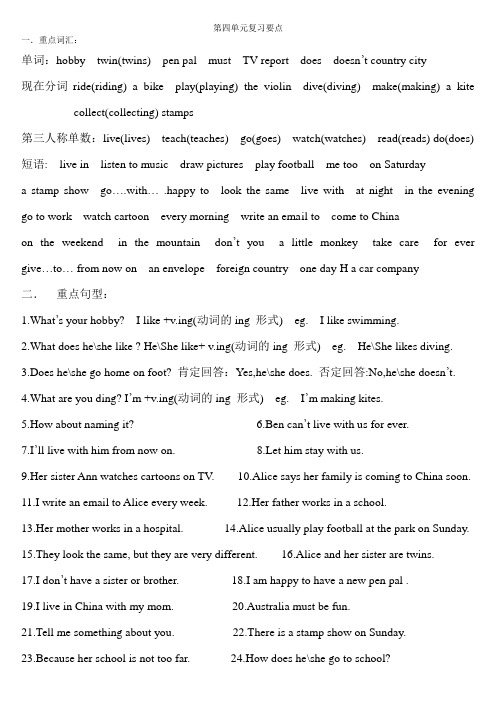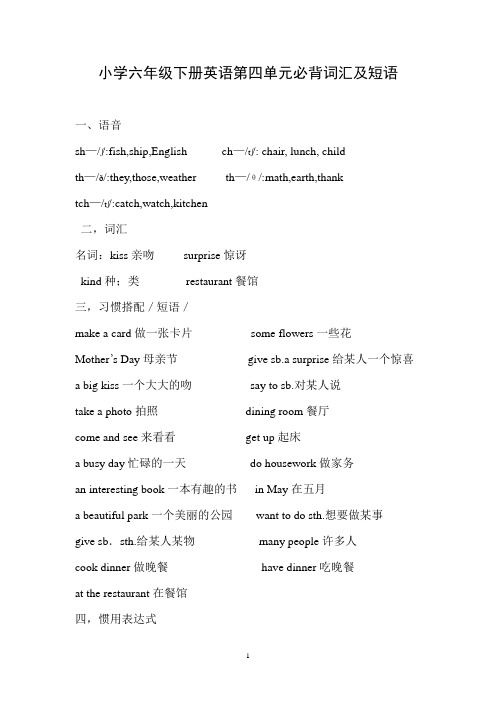人教版小学英语六年级下册第四单元复习要点
- 格式:doc
- 大小:42.50 KB
- 文档页数:3


第四单元复习要点一.重点词汇:单词:hobby twin(twins) pen pal must TV report does doesn’t country city现在分词ride(riding) a bike play(playing) the violin dive(diving) make(making) a kite collect(collecting) stamps第三人称单数:live(lives) teach(teaches) go(goes) watch(watches) read(reads) do(does) 短语: live in listen to music draw pictures play football me too on Saturdaya stamp show go….with… .happy to look the same live with at night in the evening go to work watch cartoon every morning write an email to come to Chinaon the weekend in the mountain don’t you a little monkey take care for ever give…to… from now on an envelope foreign country one day H a car company二.重点句型:1.What’s your hobby? I like +v.ing(动词的ing 形式) eg. I like swimming.2.What does he\she like ? He\She like+ v.ing(动词的ing 形式) eg. He\She likes diving.3.Does he\she go home on foot? 肯定回答:Yes,he\she does. 否定回答:No,he\she doesn’t.4.What are you ding? I’m +v.ing(动词的ing 形式) eg. I’m making kites.5.How about naming it?6.Ben can’t live with us for ever.7.I’ll live with him from now on. 8.Let him stay with us.9.Her sister Ann watches cartoons on TV. 10.Alice says her family is coming to China soon.11.I write an email to Alice every week. 12.Her father works in a school.13.Her mother works in a hospital. 14.Alice usually play football at the park on Sunday.15.They look the same, but they are very different. 16.Alice and her sister are twins.17.I don’t have a sister or brother. 18.I am happy to have a new pen pal .19.I live in China with my mom. 20.Australia must be fun.21.Tell me something about you. 22.There is a stamp show on Sunday.- 三.反义词:this—that different—same new—old always—never boy—girl little—big 四.同音词:say—see—sea or—all五.现在分词:①去e加ing make—making take—taking come—coming live—living like—liking write—writing ride—riding dive—diving have—having②直接加ing do—doing listen—listening collet—colleting play—playing③双写词尾加ing swim—swimming sit—sitting run—running 六.第三人称单数:do—does like—likes go—goes watch—watches teach—teaches read—reads come—comes七.主要语法:(1)like 后加动词的ing 形式eg. I like sing ing. He\She likes cook ing.(2) like to 后接动词原形。



小学六年级下册英语第四单元必背词汇及短语
一、语音
sh—/ʃ/:fish,ship,English ch—/tʃ/: chair, lunch, child
th—/ð/:they,those,weather th—/θ/:math,earth,thank
tch—/tʃ/:catch,watch,kitchen
二,词汇
名词:kiss亲吻surprise惊讶
kind种;类restaurant餐馆
三,习惯搭配/短语/
make a card做一张卡片some flowers一些花
Mother’s Day母亲节give sb.a surprise给某人一个惊喜a big kiss一个大大的吻say to sb.对某人说
take a photo拍照dining room餐厅
come and see来看看get up起床
a busy day忙碌的一天do housework做家务
an interesting book一本有趣的书in May在五月
a beautiful park一个美丽的公园want to do sth.想要做某事
give sb.sth.给某人某物many people许多人
cook dinner做晚餐have dinner吃晚餐
at the restaurant在餐馆
四,惯用表达式
Happy Mother’s Day!母亲节快乐!I love you!我爱你!Good idea!好主意!Wow!哇!
What a surprise!多么令人惊喜啊!。

Unit 3 Where did you go?一、词汇went (go的过去式)去camp 野营went camping (尤指在假日)野营fish钓鱼;捕鱼went fishing 去钓鱼rode (ride的过去式)骑(马;自行车)hurt (hurt的过去式)(使)受伤ate (eat的过去式)吃took (take的过去式)拍照took pictures 照相bought (buy的过去式)买gift礼物fell (fall的过去式)摔倒off从(某处)落下Labour Day 劳动节mule 骡子Turpan 吐鲁番could (can的过去式)能till 直到beach海滩;沙滩basket 篮;筐part 角色licked (lick的过去式)舔laughed (laugh的过去式)笑二、句子1.-- What happened?怎么了?--I fell off my bike and hurt my foot.我从自行车上摔下来了,弄伤了我的脚。
2.-- Are you all right?你还好吧?--Yes, Tm OK. Thanks.是的,我没事了。
谢谢。
3.Oh dear!哦,天啊!4.-- Did you go to Turpan?你去吐鲁番了吗?--Yes, I did.是的,我去了。
5.-- Who did you go with?你和谁一起去的?--My parents and my uncle.我父母和我叔叔。
6.That's too bad!那太糟糕了!e and look at my photos from the Labour Day holiday. 来看我劳动节假期的照片吧。
8.-- Where did you go?你去哪了?--Mt. Tianshan, Xinjiang. I rode a horse.新疆的天山。
我骑马了。
9.-- Where did you go over the winter holiday?在寒假期间你去了哪里?--My family and I went to Sanya.我和我的家人去了三亚。
Unit 4 Then and now概述:PEP小学英语六年级下册Unit 4 Then and now本单元共需六个课时,本单元重点学习学实物在过去和现在时间中的变化比较,主要仍是一般过去时态功能的掌握和几年前的英语表达。
要求学生能够听说认读这些过去时间的表达,说出每个实物的不同变化,并用一般过去时态简单介绍学校的变化情况。
重点学习的句型是:There was/were no...years ago.Now there is/are.... in our shoool. Before I was/were....I couldn’t/didn’t....now I......同时渗透了一般将来时太的用法。
本课是第3课时,本课主要教学内容是before, active, different, good exercise和Before I was/were....I couldn’t/didn’t....now I......句型。
在课堂教学中,教师要使教学内容生活化,从学生的日常生活出发,结合学生实际情况,使学生口语练习生活化、交际化,达到学以致用的目的。
设计理念:在跨越式为指导,以言语交际为中心,借助现代信息技术,努力为学生创设理想的英语学习环境,提供丰富的网络资源,倡导体验、实践、参与、交流与合作的学习方式。
倡导任务型教学,把言语交际能力的培养落实在教学过程中。
面向全体学生,突出“以人为本”的素质教育理想,使语言教学的过程同时成为提高人文素养、增强实践能力、培养创新精神的过程。
学情分析:由于学生是六年级学生参加跨越式教学已经有一段时间了,他们已经适应了跨越式课堂模式,听说能力有所提升。
乐于感知,模仿习得英语。
学生对我的家这一话题特别熟悉,所以本节课围绕这一话题进行语言知识学习的同时,进一步拓展与话题有关的更多知识,来满足学生对知识的所需。
教学策略:由于六年级学生已学习英语三年多了,读与说的能力相对较好,因此在教学过程中采用言语交际的教学策略,通过角色扮演、情景创设、教室内真实的辅助性教学资源提供等多种方式,激发学生学习积极性,帮助学生领会对话内容,提高学生的语言交际能力。
人教版六年级英语下册各单元总结指南本文档是对人教版六年级英语下册各单元的总结指南,旨在帮助学生更好地掌握英语知识,提高英语水平。
Unit 1 Nice to Meet You本单元主要内容包括问候语、自我介绍、问姓名等,通过研究,学生可以学会基本的英语交流用语。
Unit 2 What Time Is It?本单元主要内容是时间的表达,涉及到基本的数字和时间的说法,学生可以通过研究掌握时间表达的基本技能。
Unit 3 At a Restaurant本单元主要内容是餐厅用语、点菜和支付等,适合学生在日常生活中进行练,能够让学生用英语点餐,支付以及与服务员沟通。
Unit 4 My Day本单元主要内容是时间的表达和描述日常活动,通过研究掌握日常活动用语。
Unit 5 Our School本单元主要内容是学校场景用语及学校建筑的描述,学生可以通过研究掌握基本的学校用语。
Unit 6 My Family本单元主要内容是家庭成员的介绍、职业和工作地点等,通过研究掌握家庭成员的英语表达。
Unit 7 At the Zoo本单元主要内容是关于动物的英语表达,学生可以通过研究掌握动物名称的英语表达。
Unit 8 At the Park本单元主要内容是关于公园的英语表达,学生可以通过研究掌握公园场景用语。
Unit 9 Our City本单元主要内容是关于城市的英语表达,学生可以通过研究掌握城市的基本用语以及描述城市的特点。
Unit 10 Happy Holidays本单元主要内容是关于节假日的英语表达,学生可以通过研究掌握节假日的英语表达。
总的来说,本书包含了学生日常生活所需的各个方面的英语表达,希望学生能够在学习英语的过程中更好地掌握英语知识。
人教版小学英语新起点六年级下册Unit4 第四单元知识点精析talk about 谈论hockey 曲棍球;冰上曲棍球together 一起special 特殊,特别beaver 海(河)狸raccoon 浣熊moose北美麋;驼鹿重点能够询问某人的爱好是什么能够询问某人过去做了什么难点能够询问某人做某事的频率能够询问某人是否做过某事Lesson 11. What are your hobbies?你的爱好是什么?这是询问某人的爱好是什么的句子。
what s是what is的缩写,your是形容性物主代词,意为“你的”,在这里your 还可以换成名词所有格。
句型结构: What are+形容词性物主代词/名词所有格+ hobbies?例:—What are Tom s hobbies? 汤姆的爱好是什么?—His hobby is collecting stamps. 他的爱好是集邮。
2 .How often do you do them? 你多久做一次运动?这是用来询问做某事的频率的句子。
how often为“多久一次”。
表示频率的短语有once a day,twice a week,three times a year等句型结构:How often + do/does主语+动词(短语)原形+其他?例:How often do you eat fast food? 你多久吃一次快餐?—How often do you play basketball? 你多久打一次篮球?—Twice a week. 一周两次。
3. 辨析how often, how long与how soonhow often多久一次对频率提问how long多久,多长对时间段或物体的长度提问how soon多久以后对“in+时间段"提问,常用于一般将来时的句子中例:—How often does he come here? 他(每隔)多久来这里一次?—Once a month. 每月一次。
第四单元复习要点
一.重点词汇:
单词:hobby twin(twins) pen pal must TV report does doesn’t country city
现在分词ride(riding) a bike play(playing) the violin dive(diving) make(making) a kite collect(collecting) stamps
第三人称单数:live(lives) teach(teaches) go(goes) watch(watches) read(reads) do(does) 短语: live in listen to music draw pictures play football me too on Saturday
a stamp show go….with… .happy to look the same live with at night in the evening go to work watch cartoon every morning write an email to come to China
on the weekend in the mountain don’t you a little monkey take care for ever give…to… from now on an envelope foreign country one day H a car company
二.重点句型:
1.What’s your hobby? I like +v.ing(动词的ing 形式) eg. I like swimming.
2.What does he\she like ? He\She like+ v.ing(动词的ing 形式) eg. He\She likes diving.
3.Does he\she go home on foot? 肯定回答:Yes,he\she does. 否定回答:No,he\she doesn’t.
4.What are you ding? I’m +v.ing(动词的ing 形式) eg. I’m making kites.
5.How about naming it?
6.Ben can’t live with us for ever.
7.I’ll live with him from now on. 8.Let him stay with us.
9.Her sister Ann watches cartoons on TV. 10.Alice says her family is coming to China soon.
11.I write an email to Alice every week. 12.Her father works in a school.
13.Her mother works in a hospital. 14.Alice usually play football at the park on Sunday.
15.They look the same, but they are very different. 16.Alice and her sister are twins.
17.I don’t have a sister or brother. 18.I am happy to have a new pen pal .
19.I live in China with my mom. 20.Australia must be fun.
21.Tell me something about you. 22.There is a stamp show on Sunday.
23.Because her school is not too far. 24.How does he\she go to school?
三.反义词:this—that different—same new—old always—never boy—girl little—big 四.同音词:say—see—sea or—all
五.现在分词:①去e加ing make—making take—taking come—coming live—living like—liking write—writing ride—riding dive—diving have—having
②直接加ing do—doing listen—listening collet—colleting play—playing
③双写词尾加ing swim—swimming sit—sitting run—running 六.第三人称单数:do—does like—likes go—goes watch—watches teach—teaches read—reads come—comes
七.主要语法:(1)like 后加动词的ing 形式eg. I like sing ing. He\She likes cook ing.
(2) like to 后接动词原形。
eg. I like to sing. He\She likes cook.
(3) can 后也接动词原形。
eg. I can sing. He\She can cook.
(4) 第三人称单数后的动词加S或es . eg.①He\She teach es math.
②Your pen pal like s drawing.。